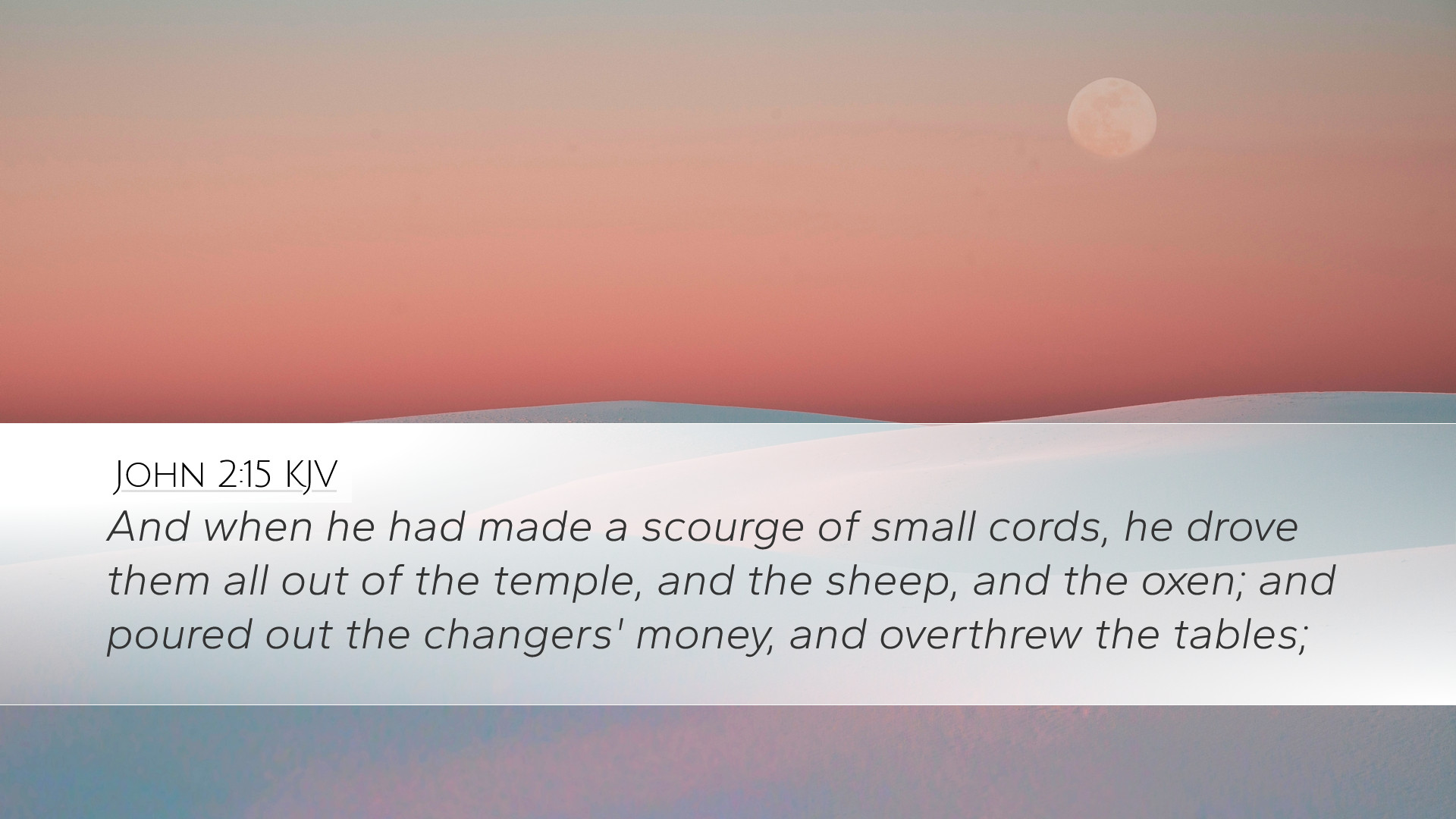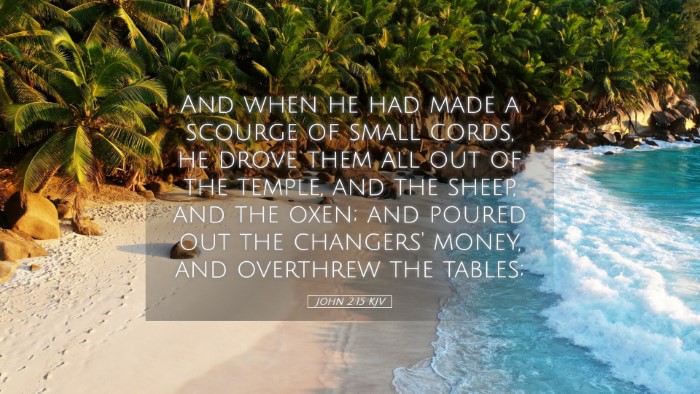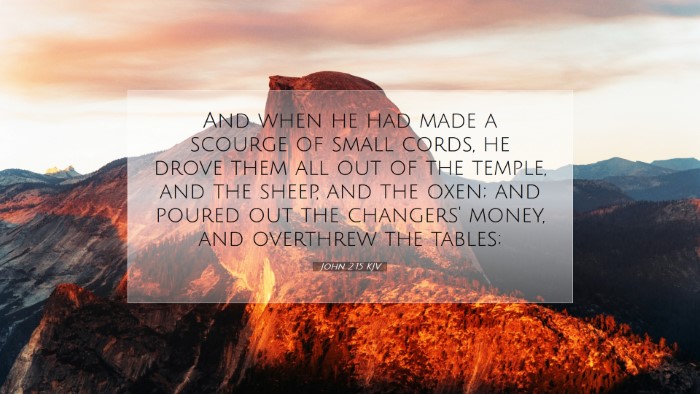Old Testament
Genesis Exodus Leviticus Numbers Deuteronomy Joshua Judges Ruth 1 Samuel 2 Samuel 1 Kings 2 Kings 1 Chronicles 2 Chronicles Ezra Nehemiah Esther Job Psalms Proverbs Ecclesiastes Song of Solomon Isaiah Jeremiah Lamentations Ezekiel Daniel Hosea Joel Amos Obadiah Jonah Micah Nahum Habakkuk Zephaniah Haggai Zechariah MalachiJohn 2:15
John 2:15 KJV
And when he had made a scourge of small cords, he drove them all out of the temple, and the sheep, and the oxen; and poured out the changers' money, and overthrew the tables;
John 2:15 Bible Commentary
Commentary on John 2:15
Upon examining John 2:15, we find a vital intersection of divine zeal and human misconduct, which calls for deep theological reflection. This verse states: "And when he had made a scourge of small cords, he drove them all out of the temple." This action of Jesus in the temple serves as a pivotal moment and reveals critical attitudes about worship, purification, and the nature of Jesus' ministry.
Contextual Analysis
To fully grasp the significance of this verse, it is essential to consider the context in which it occurs. Jesus arrives at the temple during the Passover feast when Jerusalem would have been filled with worshippers. The temple, being the central place for Jewish worship, was not merely a location for sacrifice but a representation of God's presence among His people.
Historical Background
Historically, the temple had become a marketplace rather than a house of prayer. As Matthew Henry notes, "The temple was intended to be a place of worship and reverence, yet it had deteriorated into a den of thieves." The sale of animals for sacrifices was ostensibly necessary, but the corruption and extortion associated with such transactions turned sacred practices into lucrative business deals.
Jesus' Actions
In this setting, Jesus crafted a scourge from cords and drove out those who were selling and buying in the temple. Albert Barnes elucidates that this act was not one of uncontrolled anger but rather a righteous indignation aimed at restoring the sanctity of God's house. Jesus declared, "Take these things hence; make not my Father's house a house of merchandise," (John 2:16) emphasizing the temple's purpose.
Theological Insights
There are several theological implications and lessons that emerge from the actions of Christ as recorded in this verse.
1. Righteous Anger
Jesus’ response illustrates that anger can be justified when it is directed towards the profaning of holy things. Adam Clarke highlights that while anger is often viewed unfavorably in scripture, the Bible also presents instances where it is an appropriate response to sin. The zeal exhibited by Jesus is reminiscent of the zeal for God's honor seen in Psalm 69:9, "The zeal of your house has eaten me up."
2. Purity of Worship
This passage serves as a reminder that worship must be attended by purity and sanctity. The temple's original design was for prayer, worship, and communion with God. The marketplace activities cluttered this design, much like how distractions can clutter our modern worship settings. Matthew Henry again notes that this is a call for believers to examine their own worship practices and ensure they align with God’s intentions.
3. The Authority of Christ
By taking such assertive action, Jesus declares His authority over the temple, pointing towards the greater truth of His lordship over the church and the eventual establishment of a new covenant. Albert Barnes suggests that through this act, Jesus foreshadows the dismantling of the old religious structures that would give way to a new understanding of worship in Spirit and truth (John 4:24).
Application for Believers
For pastors, students, and theologians, this verse offers profound insights into both personal and communal worship.
1. Reflect on Motivation
Believers are encouraged to reflect on the motivations behind their worship. Are we approaching God with reverence, or have our practices become ritualistic and commercialized? The challenge remains to seek authentic engagement with God in all our worship settings.
2. Restore Purity in Worship Practices
Church leaders are called to ensure that the practices of the church promote purity and do not detract from the worship experience. This includes a careful examination of the practices, resources, and activities contained within the church setting to maintain that which truly glorifies God.
3. Understanding Authority
There is a powerful reminder of Christ's authority over worship and the church as a whole. As the ultimate Priest and King, Jesus has the right to cleanse His space and His people. For pastors, recognizing their role under Christ’s authority can profoundly impact leadership and congregational life.
Conclusion
In conclusion, John 2:15 stands as a compelling narrative on the sacredness of worship and the necessary purity with which believers should approach God. This commentary, drawing from the insights of Matthew Henry, Albert Barnes, and Adam Clarke, directs us toward a more profound and intentional relationship with our Lord. We are reminded that our worship must always remain focused on honoring God and inviting His presence, free from distractions and impurities.


